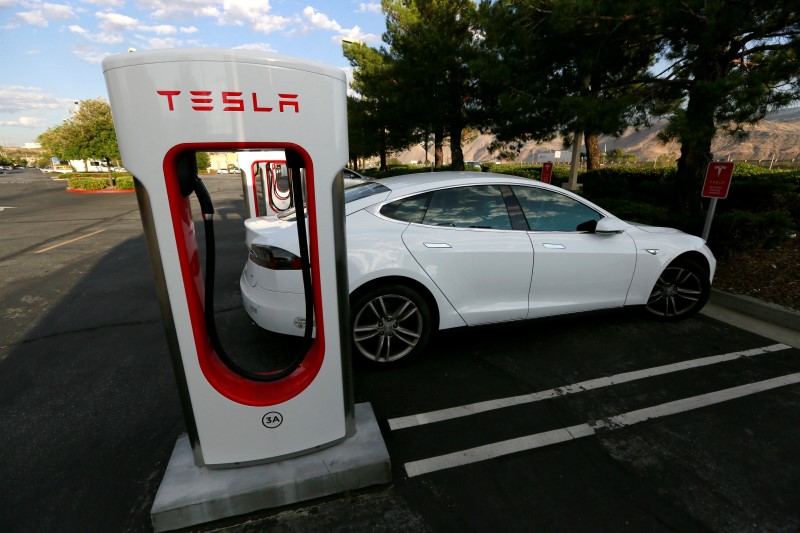By Alexandria Sage and David Shepardson
SAN FRANCISCO/WASHINGTON (Reuters) - Tesla Motors Inc (O:TSLA) crowned itself the maker of the world's fastest production car on Tuesday, saying a new version of its Model S all-electric sedan can accelerate from 0-60 miles per hour in just 2-1/2 seconds.
Tesla Chief Executive Elon Musk said the company will offer a larger upgraded battery pack for performance versions of its Model S and X vehicles that will extend range, while also allowing for super fast acceleration.
Tesla has long laid claim to bragging rights in the highly competitive luxury car market. But Tuesday's news is unlikely to change the equation on a host of challenges the company faces, from production and finances to regulation.
The new 100 kilowatt hour battery pack means the high-end version of the Model S sedan, called the P100D, will be the world's fastest accelerating car in production, the Silicon Valley automaker said. The new battery pack is also available for the performance version of the Model X sport utility vehicle.
The Model X is already the quickest SUV ever, Tesla said. But with the 100 kWh battery pack, it said the Model X P100D -- as the new performance model is known -- will now accelerate from 0-60 mph (0-97 kph) in 2.9 seconds.
The new battery also extends the driving range of the vehicles, taking the performance version of the new Model S beyond 300 miles (482.8 km), Tesla said.
Musk said that meant a driver could now travel from San Francisco to Los Angeles in temperate weather without recharging.
"These are very profound milestones and I think will help convince people around the world that electric is the future," said Musk on a conference call with journalists.
After rising more than 2 percent before Tuesday's announcement, Tesla shares pared gains to end the day at $224.84, up less than 1 percent.
Tesla said owners who had ordered a so-called Model S P90D Ludicrous but had not yet taken delivery could upgrade to the 100 kWh pack for $10,000, while existing owners can upgrade for $20,000 because the old pack must be recycled.
The electric car maker is laying the groundwork for a controversial buyout of SolarCity Corp (O:SCTY), while it also prepares for next year's launch of its high profile Model 3 mass-market vehicle.
SolarCity agreed to Tesla's $2.6 billion offer to buy the solar panel installer earlier this month, clearing one obstacle toward Musk's ambitious goal of creating a carbon-free energy and transportation company.
A filing on Tuesday showed that Musk is buying over half of a $124 million bond offer by SolarCity. It appeared to be the first time the billionaire entrepreneur has directly purchased the so-called "solar bonds" although SpaceX, his rocket and space transport services company, has bought them in the past.
In May, Tesla said it was stepping up production plans for its upcoming Model 3 mass-market sedan and would build a total of 500,000 all-electric vehicles in 2018, two years ahead of schedule, but it warned that spending will ramp up as well.
Model S and X vehicles with the upgraded batteries will help fund the more affordable Model 3 still in development, Musk said. The performance versions of the S and X without the new battery currently start at $108,000 and $115,500, respectively.
"Of course this is an expensive car. But it's very important to bear in mind that is what it's paying for, the Model 3," Musk said.
Tesla has been under investigation from U.S. safety regulators following a fatal crash in Florida earlier this year involving its drive-assistance feature known as Autopilot.
In his comments to reporters, Musk said a software update of the feature is nearing completion, adding that it will result in "material improvements in the autonomy of the car."

Tesla acknowledged that the LaFerrari and Porsche 918 Spyder with gasoline engines were faster than its new high-end S and X models. But Musk said those were both million-dollar, two-seater specialty cars that cannot be purchased new today.